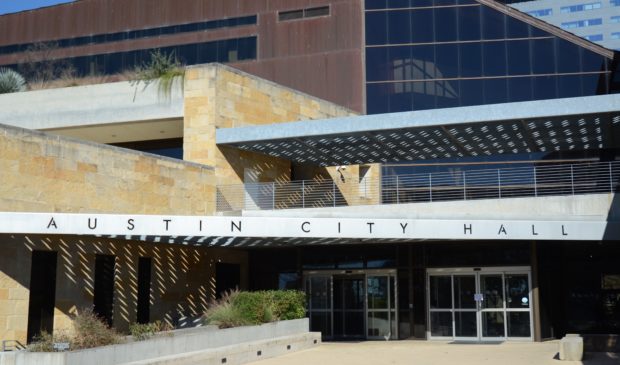City tax bills could go down for 2022
Friday, August 6, 2021 by
Jo Clifton City Council’s decision to enact a 20 percent maximum homestead exemption will save the typical homeowner $33 on next year’s tax bill if Council members decide to go along with City Manager Spencer Cronk’s proposed 3.5 percent increase in the tax rate. Austin’s Deputy Budget Officer Erik Nelson told Council Thursday that under updated numbers for property tax valuations, a typical senior or disabled homeowner would save more than $184 over their current bill – and the city will have a balanced budget.
However, projections for the city budget are not nearly as favorable next year. With a revenue cap increase of 3.5 percent imposed by the state, budget writers expect a $5.5 million deficit in Fiscal Year 2023, Nelson explained. By FY 2025-26, Nelson expects the deficit to be $15.6 million under the 3.5 percent cap. (Council can ask voters to increase the tax rate through an election and that seems likely in the future, though not this year.)
For this year, Council still has some money to put into one-time costs, and that could be the focus of final budget negotiations.
One department near and dear to the hearts of Austinites as well as Council members is the Parks and Recreation Department. PARD Director Kimberly McNeeley reported that she currently has just 21 park rangers to provide coverage for 303 parks comprising 17,000 acres. Park rangers help patrol the park system, enforce park regulations, provide information to visitors and help connect people experiencing homelessness to services.
Working with the Austin Parks Foundation, McNeeley said Cronk has already made some additions to the department’s budget. But several important items still remain to be funded. The department needs an additional 12 full-time rangers at a cost of $1.2 million, plus one-time funding needs of about $490,000 for a total of $1.7 million.
McNeeley also advocated for an increase in funds for the department’s after-school programs for children between 5 and 15 years old at city recreation centers. The program is experiencing increasing demand, particularly in areas east of Interstate 35. The program has space for 375 more children at PARD sites throughout the city, but does not have the funds needed to serve the increased demand, she said.
Under operations and maintenance, McNeeley said her department is working on delivering on the acquisition of 107 acres of new parkland and renovating a variety of old and new buildings, including the Seaholm Intake Facility, the Zilker Maintenance Barn, the Zilker Clubhouse and the Pharr Tennis Center. PARD is also developing two new pocket parks and improving parks in five different districts, and park workers are improving trails along the Holly Lakefront, Slaughter Creek Greenbelt, Northern Walnut Creek Greenbelt, and connecting the Violet Crown Trail to the Veloway.
The department also needs an additional full-time employee at a cost of $30,000 to provide computer-assisted drafting for various projects, including systems upgrades, building renovation and ADA accessibility. Hiring one employee would reduce PARD’s reliance on outside consultants and potentially save tens of thousands of dollars.
In response to a question from Council Member Mackenzie Kelly about whether the increased need for after-school programs might be a result of changes in Covid restrictions from last year, McNeeley said her department keeps track of names on waiting lists, so her staff is aware of the fact that there is more demand than there are available spots. She told Kelly she would be able to provide year-over-year analysis of the spaces needed. “So that’s how we know that we are in demand.” She added that because of Covid they were not able to take as many children into the summer camp program this year, but they were not using those numbers to determine the need for additional funds.
Council Member Alison Alter asked McNeeley if she had to choose among her funding requests, what she would select. She said that was like asking which of her children she loved the best, but she chose increased funding for the after-school program and addition of the 12 new park rangers.
Council Member Leslie Pool said previous investments in the after-school program had greatly benefited children and she reiterated that the city’s recreation center provides academic, social, and physical benefits to the city’s children – which is of particular concern considering the loss of academic achievement as a result of the pandemic. Pool said she would bring a budget amendment to Council to add the $1.2 million requested for the after-school program.
Mayor Pro Tem Natasha Harper-Madison said she knows of people who would like to make specific donations for investments in various parks and recreation centers but did not know where they could make such donations. She said some people wanted to make donations for improvements to the Millennium Youth Entertainment Complex. In the future, people can make such donations through a nonprofit corporation set up through the city’s new economic development corporation. The corporation is in the process of being formed and a board is meeting regularly and starting to recruit key staff. In the meantime, Austin Parks Foundation will accept directed donations.
The Austin Monitor’s work is made possible by donations from the community. Though our reporting covers donors from time to time, we are careful to keep business and editorial efforts separate while maintaining transparency. A complete list of donors is available here, and our code of ethics is explained here.
You're a community leader
And we’re honored you look to us for serious, in-depth news. You know a strong community needs local and dedicated watchdog reporting. We’re here for you and that won’t change. Now will you take the powerful next step and support our nonprofit news organization?









